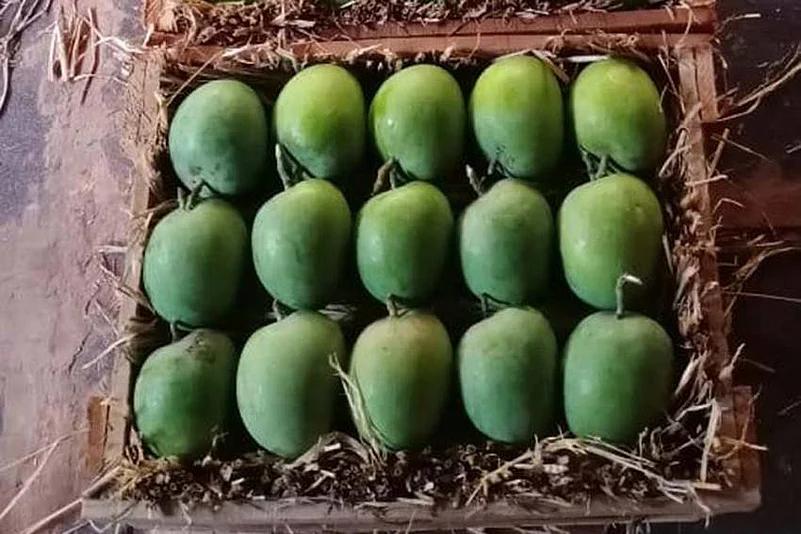A dozen mangoes for Rs 18,000? Sounds ludicrous, doesn’t it? That is the price mango cultivators Uttam Phondekar and his father Abba received for the first box of the season’s Devgad Alphonso mangoes they sold in the Pune market, some days ago. The Devgad Alphonso, which is harvested in November, fetches a much higher price than that sold in the traditional mango season from April till June. In all, the Phondekars have sold 10 dozens in the first lot that has left their mango orchard in Kumbharmath village, in Sidhudurg district of Maharashtra.
Of the 400 mango trees in their orchard, only six flowered and bore the fruits – 10 dozen in all. The rest of the crop was damaged due to the very heavy rains that lashed the Konkan region this monsoon.
Traditionally, the first box of mangoes to leave the district is auctioned at a higher price, while the subsequent boxes fetch a lesser price. Interestingly, the Ratnagiri Alphonso mangoes fetch a lower price than the Devgad Alphonso, though both are grown by cultivators in the Konkan belt, located in the west coast of Maharashtra. The taste of the Devgad Alphonso is felt on the tongue, while that of the Ratnagiri Alphonso is felt in the throat, said Uttam Phondekar to Outlook Magazine.
The age-old rivalry between the cultivators of both these varieties of mangoes is legendary folklore in the Konkan belt.
Prior to the sale of the first batch of mangoes, the Phondekars sealed the deal at Rs 18,000 for a dozen. Uttam Phondekar revealed to Outlook Magazine that they received information that the middlemen had pegged the final price at Rs 25,000 for a dozen. “Once a price is agreed upon, we cannot get more than that. We know that the mangoes were sold at a much higher price than the original deal. It could be Rs 25,000,” said Phondekar.
The middlemen never reveal the identity of the buyer to anyone. The buyer is often a high value customer, a celebrity or a VVIP, said Phondekar. “The buyer is identified much before the mangoes hit the market. This way the exclusivity of the first batch is maintained and it fetches a very high price,” he said. Though every batch of mangoes taste the same, the price is fixed for the snobbery of exclusivity.
The first produce from the Phondekar orchard hit the market in 2018 (November) when it fetched them Rs 13,500 for a dozen. In 2019, due to the delay in selling the fruit, it brought in only Rs 9,000 for a dozen. “Ideally, it has to be sold by the first week of November. Any delay reduces the price of the produce, even if it is the first of the season,” narrated Phondekar. In 2020, due to the Covid-19 lockdown, they were unable to sell their produce. It was sold in the local market in Malvan at a throwaway price, he said.
The Phondekars harvest mangoes in two seasons – one variety in November and the other in the April – May. The latter variety of Devgad Alphonso is moderately priced. Interestingly, the Phondekar family – men, women and even children – have never tasted the November produce. In the Monsoon season the fruit takes three and a half months to ripen, whereas in the summer months, it is ready in three months or even less. The taste of the fruits is different in both seasons.

“We have not eaten even a single mango from the November harvest, as it is too expensive. We never tell the children that the mangoes have been harvested. We feel guilty eating or even tasting such expensive mangoes,” said Phondekar.
According to him, it is a daunting struggle to keep the mango flowers intact and from being destroyed by the rains. “It rains very heavily in the Konkan region. We put up shed-nets and plastic sheets hoisted on tall bamboo sheds around the trees. This year we could only save the flowers of six trees, out of 400, as it is very expensive to put up shed-nets or plastic covers for the trees. The cost of putting shed-nets for a single tree is about Rs 12,000.”
The revenue may seem much but everything is ploughed back into the next season, so their lifestyle continues to be the same hand-to-mouth existence, he said.
















